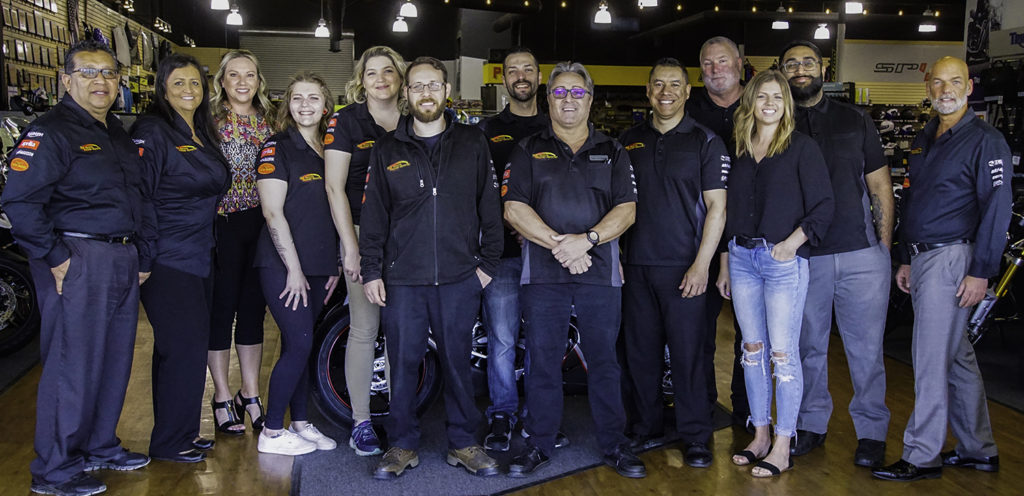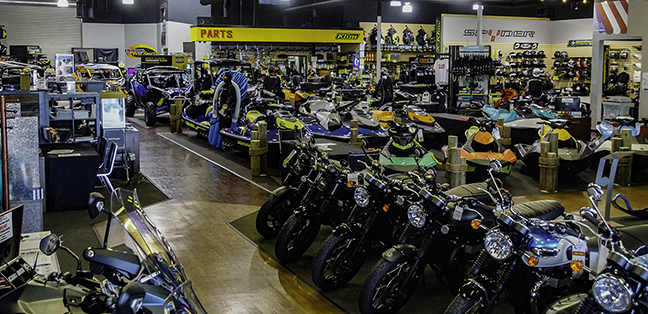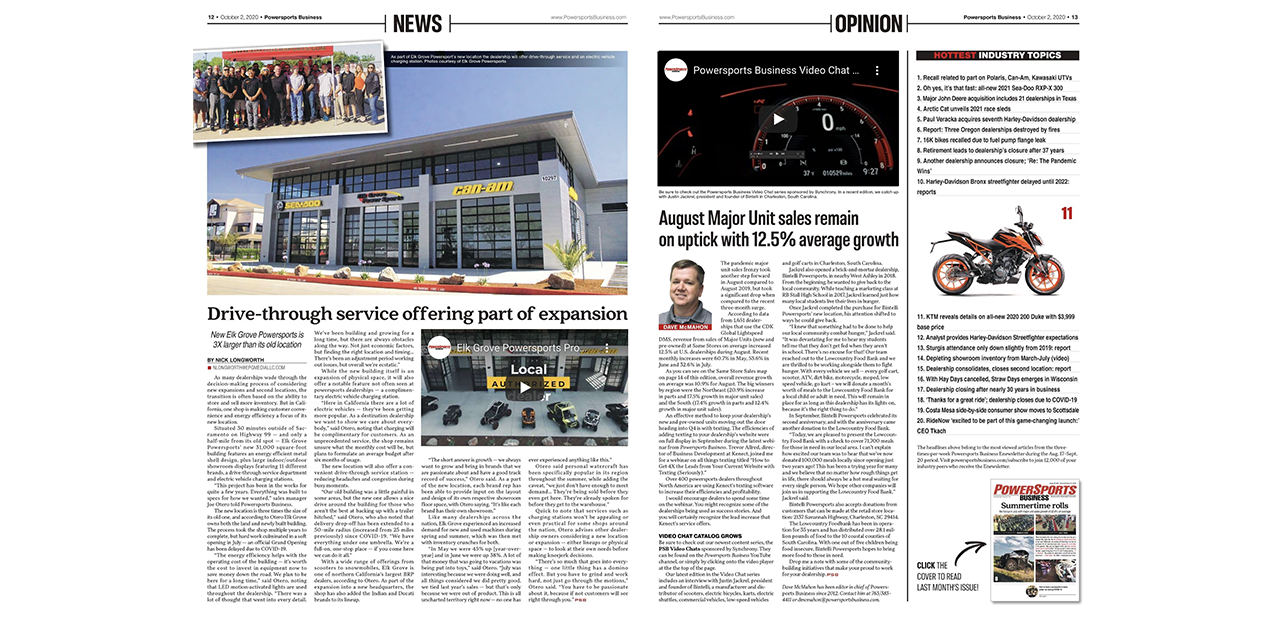‘It’s really been a team effort to all get through this’: dealer
With the onset of COVID-19, many dealerships across the nation have seen an overall decrease in business. But for many a caveat has often been maintaining steady revenue streams through parts and service to offset the loss in foot traffic, with a pleasantly unexpected increase in online activity. Powersports Business staff reporter Nick Longworth checked in with dealerships in various parts of the country to get their take.
“Business has been down. Under California mandate we had to shut our showroom down, but service and parts have remained open… In March we were 10 percent down, and April [was] tracking at 8 percent down,” said Scott Spanner, owner and general manager of Elk Grove Powersports since 2001. Similar to other dealerships, Elk Grove has also adapted to offer curbside parts pickup and also free shipping within a 50-mile radius.

Despite an open showroom floor in Florida after being deemed “essential” by state officials, overall business has also been down for Cycles of Jacksonville as well.
“We’re seeing what a lot of dealers around the country are seeing — our Jacksonville store is down about 40 percent,” said Greg Mackey, owner of Cycle of Jacksonville and Interstate Cycles in Lake City, Florida.
But in recent weeks dealerships have begun to see a clear silver lining during the pandemic — an increase in remote sales and leads.
“Our Jacksonville store has seen a 46 percent spike in online traffic,” said Mackey. “Social media traffic is up about 72 percent. Our leads are up, and just in the last week we finally started seeing slow foot traffic again.”
“We have a lot of calls coming in — we’ve been closing sales over the phone,” said Spanner of Elk Grove Powersports. “Right now we’re all over the place. We’re working hard to work with the consumer so they don’t have to physically come in. If someone still wants to come in to feel, and touch a machine they can, but we don’t have an open showroom to just walk in off the street right now.”
As an all-hands-on-deck approach, Elk Grove Powersports maintained a sales staff, despite needing to furlough other employees. Both Spanner and his wife also took four-week payroll leaves in order to conserve cash.
“We needed to make some adjustments, especially payroll-wise, which is our largest expense. We’ve really dug deep into our pockets to give guys sales incentives to hit goals and make sales,” said Spanner. “Our team has done an outstanding job as far as pushing through this — some of the days we’ve had have been unbelievable, right in the middle of this virus. It’s really been a team effort to all get through this.”
According to Mackey, rural dealerships have seemingly fared better than ones in metropolitan regions. It’s a pattern he’s noticed after talking to dealership owner peers across the country.
“Our rural store has tagged along like nothing ever happened,” he said. “Many consumers had vacations and cruises planned that have been cancelled, and so instead they bought toys for the family.”
For many dealerships, social media and promotional consistency was previously a priority for marketing departments, but it’s now taken on a new level of importance for communication with a customer base in the wake of COVID-19.

“I’ve doubled our SEO and SEM advertising to help get us out there and get more phone calls coming in. I’m a consumer myself and there are a lot of good deals going on in the market as far as vehicles, but there’s this fear of making a purchase right now at this time,” said Spanner. “We sat down with our marketing guy and dealt with our social media to make sure we started getting pictures of all our vehicles posted to show that people are still out buying. I want everybody to understand that they don’t have to be entirely locked down; they can still spend money. We have gotten a lot of reaction from our posts, and it’s built from there.“
“We were posting pretty sporadic before COVID-19, but now we have a system intact doing multiple posts a day to make sure people know we’re open. Once we saw the trend, we did up our spending on SEO, SEM and social media promotion,” said Florida-based Mackey. “We’re making sure that we’re communicating our message consistently across multiple platforms. Once we saw the organic spike in web traffic it was really an eye-opener, especially during this quarantine; we’ve gone full-bore online and social media.”
Although some operational changes might become fad once COVID-19 begins to dissipate throughout the overall population, others might become permanent.
“The online business and remote-style deliveries that we’re doing now is only going to increase. I’m thinking that’s the way the industry might go — less face-to-face shopping and more online and phone sales,” said Spanner.
“We make sure we’re compliant with the CDC guidelines, and that kind of stuff. We’ve been a lot more nimble,” said Mackey. “We’ve offered touchless deliveries and free deliveries to homes. All of our major manufacturers have suspended their policy that the customer has to be in the dealership to take a delivery, which has allowed us to delivery goods personally.”
Both of Mackey’s management teams have also since adopted Zoom meetings once a week instead of quarterly meetings, saying, “It’s been nice, we’re meeting once a week for about an hour to share best practices of what’s working and what’s not.”
With an unprecedented pandemic not in hindsight yet, some lessons will undoubtedly carry into future economic recessions for many dealerships.
“We’ve got some really good people, and they all know that we can pretty much pull through anything. We’re taking one day at a time right now. Long-term plans are tough,” said Spanner. “If we continue how we’re going we can last another 18 months, but if we get shut down even further it will be hard to maintain. But for now we can sustain for a very long time at the current business level we’re doing.”
In the industry since 1986, Mackey has been through multiple economic downturns, and relies on what he’s already learned.
“We got a very expensive education in 2008-2009. We were much quicker to react and watch our inventory levels, parts and accessories this time. We ran a really tight ship coming into this. In 2008 we never made the adjustments we needed to and it put a hurting on us,” he said. “We’re much more prepared this time… We’re watching transactional data every day. We’re taking in a lot more information. If it stays where it’s at, we’re fine.”

